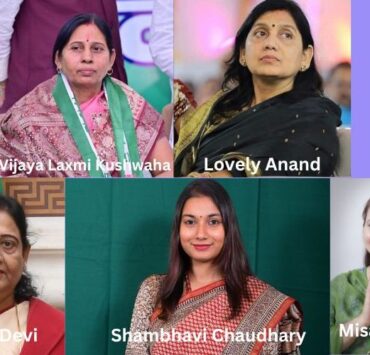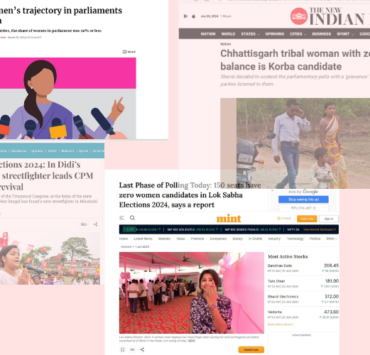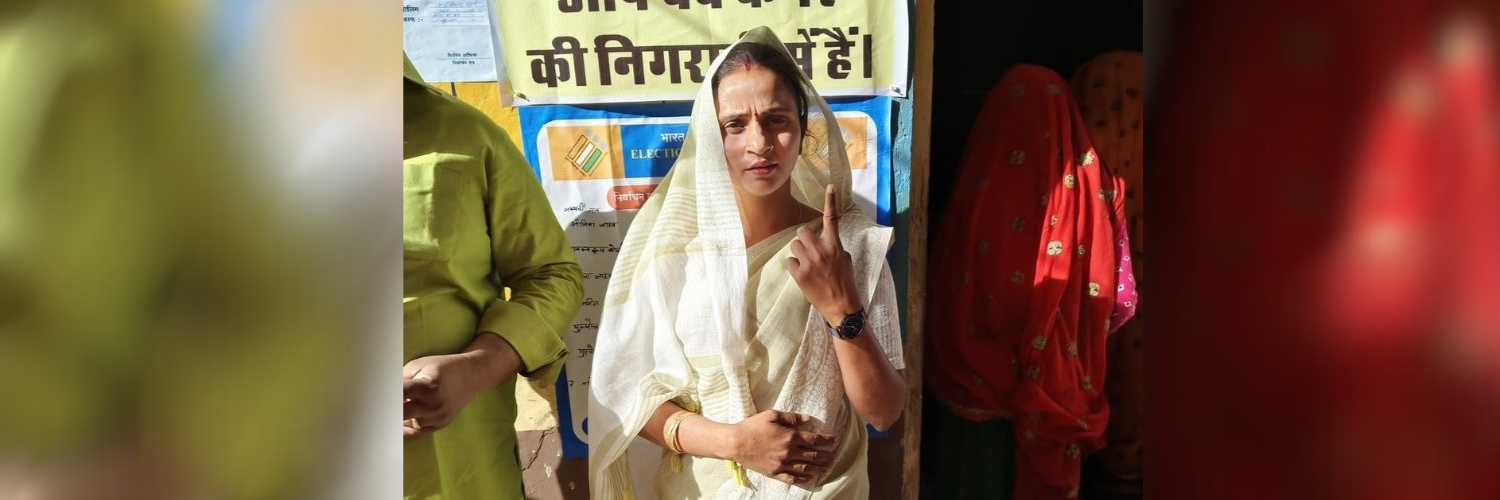
By Rakhee Roytalukdar
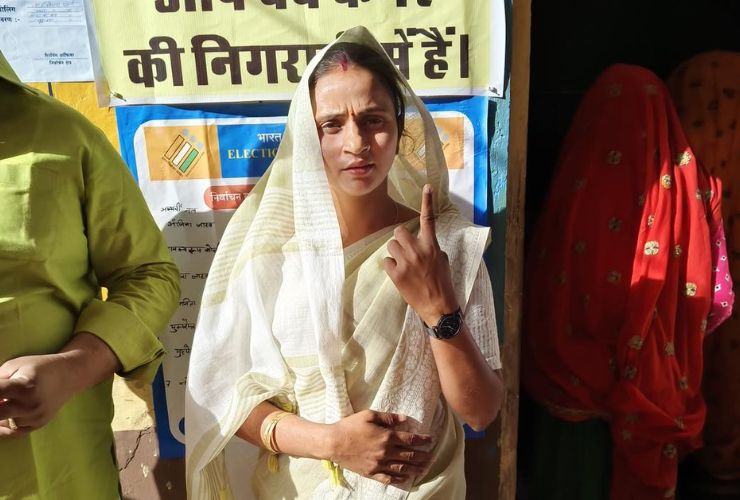
Desperately seeking women politicians at all levels of the polity in Rajasthan to make the Women’s Reservation Bill a reality
Rajasthan has always been known as the land of Rajas and Maharajas, who were acknowledged for their valour and courage.
The desert land, however, has never been known as ‘land of maharanis’, even though women like Rani Padmavati of Chittorgarh and Maharani Karnawati of Mewar were renowned for their bravery and determination.
In the present era, Gayatri Devi and Vasundhara Raje, both from erstwhile royal families, have made their mark in the battle of the ballot.
Gayatri Devi, hailing from West Bengal’s Coochbehar royal family of yore, was the first to think of starting a school in Rajasthan – Maharani Gayatri Devi School for Girls, mainly to bring girls out of the regressive purdah system. She is remembered in equal measure for her landslide victory during her electoral debut in 1962.
On the other hand, Vasundhara Raje, born into the erstwhile Scindia royal family of Gwalior, Madhya Pradesh, and married into the former royal family of Dholpur (eastern Rajasthan), became the first woman chief minister of Rajasthan. She had the courage to initiate many transformative reforms.
Yet the state, still entrenched within a patriarchal mindset, has spawned a culture where discrimination against women is accepted as part of life.
Discrimination starts early with sex-selective abortion, child marriage, purdah and practice of disallowing girls to study beyond the primary level. They are expected to look after the house and younger siblings and are generally excluded from any major decision-making within the family and community.
Even in panchayats, where there is 50% reservation for women in the state, panchayat patis (husbands) rule the roost. In other words, many of the women are mere puppets and most often, their husbands are the puppet masters.
In terms of Parliamentary politics, women from Rajasthan started participating as candidates from the very first general election in 1952, but a woman got elected to the Lok Sabha only after 10 years. Gayatri Devi was the first woman MP, who won the Jaipur seat, contesting as a Swatantra Party candidate and winning it with a margin of 1,57,692 votes and a vote share of 61.3% in 1962. She earned a place in the Guinness Book of World Record for her overwhelming victory.
Rajasthan has had only 34 women Parliamentarians in the last 72 years (between 1952 and 2024).
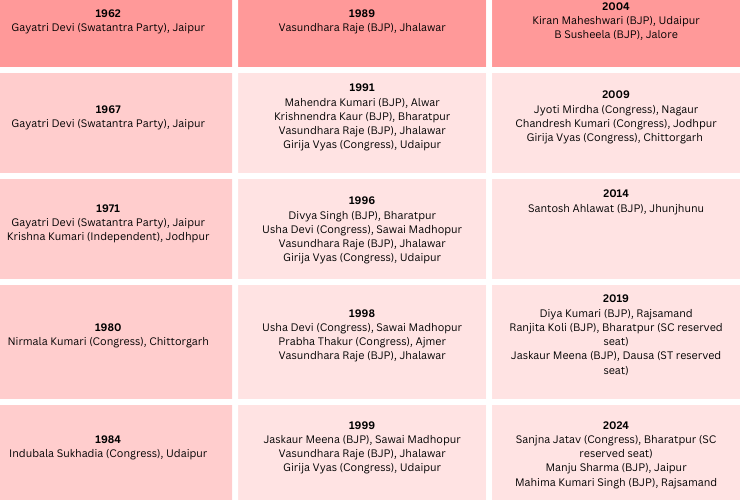
In the last two general elections (in 2019 and 2024), Rajasthan elected the same number of women MPs – three. However, by then the number of women voters had gone up to 2.51 crore in 2023-2024.
The number of women voters in Rajasthan during the first general election in the country is not clear on account of many reasons. What is to be noted is that in the first general election, in many states, including Rajasthan, many women had enrolled themselves on the basis of their relationship with the male members in their family instead of their own names. There were public awareness campaigns to exhort the women to register themselves with their own names. Of 80 million women voters in the country then (in 1952), at least 2.8 million failed to disclose their proper names and, as such, their entries had to be deleted from the electoral rolls, according to an official report on the first general elections published in 1955.
In 2014 and 2019, all the 25 seats were swept by the Bharatiya Janata Party (BJP). In 2019, Ranjita Koli from Bharatpur (reserved seat for Scheduled Caste (SC)), Jaskaur Meena from Dausa (reserved seat for Scheduled Tribe (ST)), and Diya Kumari from Rajsamand were elected. In 2014, there was only one woman MP from the BJP – Santosh Ahlawat from Jhunjhunu.
In 2024, all three women MPs hail from diverse backgrounds. They form only 12% of the total 25 MPs from the state.
The most-talked-about winner is Sanjna Jatav, a 26-year-old Dalit leader, who won Bharatpur, a reserved constituency for the SC, with a margin of 51,983 votes. She triumphed over BJP’s Ramswaroop Koli and polled 5,79,890 votes.
What is heartening is that despite Sanjna losing the Assembly election six months ago from Kathumar by just 409 votes, the Indian National Congress (INC) reposed faith in her. Having worked hard on Priyanka Gandhi’s ‘Ladki Hoon Lad Sakti Hoon campaign’ and also in her outreach work amongst households, Sanjna could not be overlooked, although money, muscle power and the fact that the state’s Chief Minister Bhajanlal Sharma hailed from this region, weighed against her.
In this state, with a largely feudalistic and patriarchal set-up, what is refreshing is that Sanjna’s in-laws and her husband, Kaptan Singh, encouraged her to join politics. She is also the only winning woman candidate from the INC this time.
Sanjna, whose dancing video after her win went viral, says politics was never on her mind as she grew up in a non-political family. But her in-laws, especially her father-in-law Harbhajan Singh Jatav, encouraged her to take an active role in politics. With a BA and law degree under her belt, her first taste of politics was when she contested the Alwar Zila Parishad in 2021 and won.
She says her mother-in-law and Kaptan Singh, who is in the Rajasthan Police, have promised to look after their two children, a six-year-old girl and a four-year-old boy.
“They have no idea of my political engagements and want me to be there with them. Despite my involvement, I believe a mother will always remain a mother first. In Parliament, my priority would be to raise the issue of scarcity of water and reservation for Jats and Gujjars of Bharatpur, who were left behind when the NDA government included Jats in the OBC list in 1999. I also want to talk about reducing migration of labourers by generating more jobs in the region and by opening more educational institutes for girls.”
Although she is new to Parliament, she is not nervous and says she would raise issues fearlessly but needs to understand the rules to be followed in the Lok Sabha.
The INC fielded two other women from Pali – Sangeeta Beniwal and Urmila Jain Bhaya from Jhalawar-Baran. Sangeeta, 45, said to be close to former Chief Minister Ashok Gehlot, has been the president of the Rajasthan State Commission for Protection of Child Rights and president of women’s rural Congress in Jodhpur district. Sangeeta lost to BJP’s PP Choudhary by 2,45,351 votes. She polled 5,12,038 votes and earned a vote share of 37.82%
Urmila, 53, a social worker, lost to Raje’s son and fifth term MP Dushyant Singh by 3,70,989 votes in Jhalawar-Baran constituency. Urmila is the wife of INC leader and former minister Pramod Jain Bhaya. Considering Raje’s dominance in the region, Urmila still polled 4, 94,387 votes and earned a vote share of 34.78%.
Tara Krishnaswamy, co-founder of Political Shakti, a non-partisan collective working for greater political representation of women, says Sanjna’s case is one bright spot in the otherwise dismal political scenario regarding women MPs. In the 18th Lok Sabha, the number of women MPs in the Lower House has dropped from 78 in the 17th Lok Sabha to 74.
She adds: “It is very difficult for women to make a breakthrough in politics, competing with rich, upper caste men and male dynasts. There is hardly any first chance. And if you lose, there is no question of a second chance for women, especially from Dalit communities. Sanjna was fielded in spite of losing in the Assembly polls. Kudos to her party for enabling her.”
Rajasthan’s two main parties – the BJP and the INC – do not shy away from fielding dynasts and relatives of political families, even if they keep losing elections and often offer them a second lease.
Rajasthan’s erstwhile royal families still hold sway over politics, especially in the case of women candidates, who have mostly won with big margins. Probably the citizens’ trust and reverence for the former royal scions and the money they can spend on their elections take them comfortably across the finishing line.
The MPs from the erstwhile royal clans include Krishna Kumari (Independent) from Jodhpur (1971); Mahendra Kumari (BJP), Alwar (1991); Divya Singh, (BJP), Bharatpur (1996); Chandresh Kumari (Congress), Jodhpur, (2009); and Diya Kumari, (BJP) Rajsamand, 2019 and now Mahima Kumari Singh, (BJP), Rajsamand, 2024.
BJP fielded Jyoti Mirdha again from Nagaur after she lost her Assembly seat in 2023. Jyoti, grand-daughter of Nathuram Mirdha, one of the tallest leaders of the INC in the Marwar region, joined BJP just before the election. She lost this time too. She had won Nagaur Lok Sabha in 2009 on a INC ticket.
Similarly, the INC fielded Archana Sharma twice from Malviya Nagar Assembly constituency in 2018 and 2023, but she lost both times. She hails from a family whose members are from both the BJP and the INC.
Sanjna’s colleagues and fellow MPs from the BJP are Manju Sharma from Jaipur and Mahima Kumari Singh from Rajsamand. They are also first timers in the Lok Sabha.
Jaipur Lok Sabha constituency has a woman MP 47 years after it was won by Gayatri Devi. A Brahmin-dominated seat, the BJP has won Jaipur nine times and three times in a row. Manju Sharma, 64, who won with a margin of 3,31,767 votes and polled 8,86,850 votes, is, however, a dynast. She defeated the INC’s Pratap Singh Khachariywas, a former minister. She is the daughter of Bhanwar Lal Sharma, a former minister, MLA and an influential Brahmin leader. An active BJP worker, she, however, had lost her first election as an MLA candidate in 2008.
Mahima Kumari Singh, from the former Mewar royal family, won with a margin of 3,92,223 votes and polled 7,81,203 votes against the INC’s Damodar Gujjar. Her husband, Vishwaraj Singh Mewar, is an MLA from Nathdwara, who had joined the BJP just before the Assembly polls in 2024. Mahima dismisses the dynastic allegation saying her family has had political connections since long, as her father-in-law was Chittorgarh MP in 1989. She says people generally trust candidates from former royal families as they keep in touch with the masses. They believe that since the former royals are wealthy, they do not need to indulge in corruption! Mahima says she built an extensive network while campaigning for her husband in the recent Assembly election.
Other than Jyoti Mirdha, the BJP’s two other losing women candidates were Indu Devi Jatav from Karauli Dholpur, (reserved for the SC) and Priyanka Balan Meghwal from Ganganagar (reserved for SC). Indu Devi earned a 43.6% vote share while Priyanka earned a vote share of 45.2%.
The 74 newly elected women MPs in the 18th Lok Sabha make up just 13.63% of the elected strength of the House, much less than the 33% that is going to be reserved for women after the next delimitation exercise.
If the Women Reservation Bill’s with its one-third formula is followed, of 25 seats in Rajasthan, each party needs to field at least nine women candidates in Rajasthan. Only eight candidates were in the fray this time, three from the INC and five from the BJP. Of that three of the women won. So, the winning percentage of women candidates is 37.5%.
Krishnaswamy says: “Although the number of tickets given is too low, their strike rate is impressive, meaning women are winnable candidates. Women compete with men in terms of reservation, caste equations and winnability in all seats – irrespective of it being general or reserved. It is not a level playing field. The reality of Indian politics is that women compete with rich, upper caste males from privileged families entrenched in politics.
For the bill to make a real difference, there needs to be quotas at every level of politics, including at the ticket distribution stage. India needs to accommodate more women leaders and decision makers at the top level.”
Rakhee Roytalukdar has been a journalist for more than 25 years. She has been writing on politics, gender issues, tourism, wildlife, human interests and other topics. Having started with The Telegraph, she has worked with The Times of India, IANS, The Pioneer, UNI and others. She covered Rajasthan as a correspondent for The Telegraph for more than 10 years. She is at present writing for Deccan Herald.
Edited by Saraswathy Nagarajan

